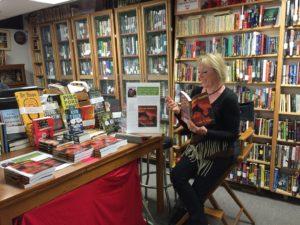
A writer hates when audiences at her author readings begin to fidget. She worries when — right before she “gets to the good part” — one or two listeners begin to murmur mutinous words. But she really begins to eyeball the nearest exit or fortify herself against hurled brickbats (whatever those are) when listeners’ heads begin to loll. That’s a sure tipoff that revolt is imminent. She’d better kick up her game or the audience will kill with spoiled fruit, uncomprehending stares and glass-shattering snores.
This experience is not unique to writers. Anyone who throws themselves and their work out there in front of God and everybody, is vulnerable. Speech makers, athletes, even drum soloists. Make a wrong move or inflection, and a previously indulgent crowd turns ugly.
Unless you are a natural-born performer, doing book readings is a learning process. One with a stupidly steep curve, and no escape. Once underway in a scheduled event, you grin and bear up, changing course as you go. You attend those golden moments when listeners’ eyes are open and bright, when coughing is suspended.
I remember one bookstore event where, after I briefly explained the book’s plot and to-be-read scene, I noticed I had chosen a passage that was fun for ME to read. It followed that if it were fun for me to share and re-experience, it was fun for the audience. They keyed not merely on the words or how they were stitched together. But they also took their cue from my reaction to the words. If I were enjoying, so would they!
Of course my enjoyment had to be real, not faked. They knew if I were “acting.” So I always pick passages that make ME laugh, cry, learn something, or figuratively be in the setting — whether to linger or to escape.
In another reading, this time for a book club, I used what I learned about picking and enjoying scenes. I also began to edit out words or re-cast phrases as I went. Rewriting on the fly. Your book is never polished enough!
A third reading, this time at a large bookstore, showed clearly that a reader’s time is money. You don’t do it right, you won’t make money. There were a lot of people, I was sharing the hour with several other writers, and I had to make a big impact in a short time. So. I chose to keep short the sections I read aloud, and chose only the best — with action, humor and bits of fascinating intel. Did what TV and radio people call “sound bites.” Not as short as in electronic media. But definitely interesting, stand-alone mini-thoughts and mini-scenes. Even if it meant deleting words, changing phrases or deleting some things altogether.
Above all I saw that I must also prime my audience for pleasure. Encourage listeners to care for me as a person, and about my book as an experience they might undergo. I share a bit about my background and motivation — only a bit. About my struggle to be published, my newspaper background, about how my love of animals informs my work. Then I tell how the book’s setting and characters are real, relatable. If my action unfolds in Oregon’s Rogue Valley, I help my listeners see and feel it. Because my character uses wit, perseverance and daring to address difficulty, I spend a moment on that.
The cardinal rule of author readings: ABHOR TO BORE! You’re not only providing info on a book. You are also building a relationship with readers. It’s been said before, but it is worth repeating: You only have one chance to make a good first impression.
Or to avoid death by rotten tomato.
